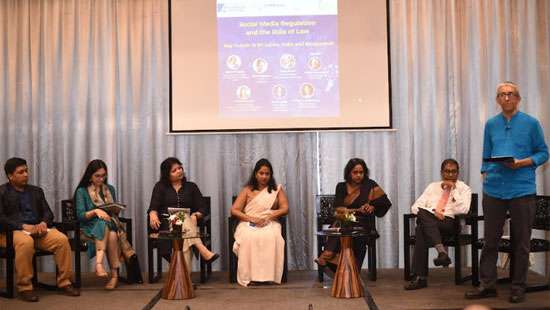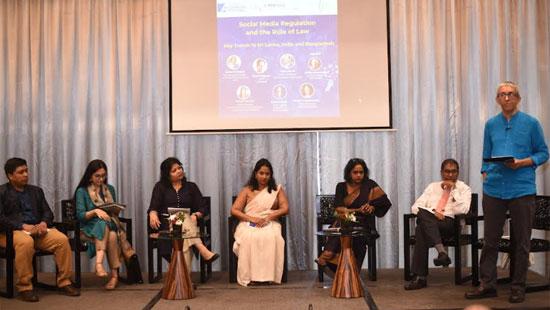Reply To:
Name - Reply Comment

 Colombo - A groundbreaking report titled "Social Media Regulation and Rule of Law: Key Trends in Sri Lanka, India, and Bangladesh" was recently unveiled in Colombo, offering insights into the complex interplay between social media regulation and the rule of law in these South Asian nations.
Colombo - A groundbreaking report titled "Social Media Regulation and Rule of Law: Key Trends in Sri Lanka, India, and Bangladesh" was recently unveiled in Colombo, offering insights into the complex interplay between social media regulation and the rule of law in these South Asian nations.
Produced collaboratively by Konrad Adenauer Stiftung’s Rule of Law Programme Asia, LIRNEasia Sri Lanka, the Centre for Communication Governance (CCG) at the National Law University Delhi (NLUD) India, and the School of Law at BRAC University Bangladesh, the report delves into critical issues such as free speech, privacy, internet shutdowns, and content control.
The report highlights the significant influence of social media on national security and human rights, underlining challenges such as:
Liability Exemptions: Bangladesh and India offer conditional liability exemptions for third-party content hosted by intermediaries. However, recent legislative trends indicate a weakening of these protections.
Centralisation of Executive Power: Regulatory power is increasingly centralised within the executive branch in all three countries, resulting in frameworks lacking effective judicial and parliamentary oversight over decisions regarding blocking orders, internet suspensions, and user data requests.
Censorship and Free Speech: Censorship under the pretext of state security has curtailed legally permissible speech in all three nations, with broad and vague language in laws governing online and general speech-related offences posing significant concerns.
Transparency and Accountability: The centralisation of power has led to a lack of transparency and accountability in government actions, often justified by state security interests.
Key recommendations:
The report proposes several recommendations to address these challenges:
Precise Definitions and Narrow Scope: Adopt precise and narrow definitions of online harms and limit national security exceptions to reduce discretion and arbitrariness in enforcement.
Safeguards Against State Power Abuse: Strengthen safeguards against potential state abuse of power by implementing measures such as ex-ante judicial approval, ex-post judicial review, independent oversight, public disclosure of information, fair hearings, and accessible grievance resolution mechanisms.
Reforming Online Safety and Platform Accountability: Overhaul the social media regulatory framework to prioritize online safety and enforce platform accountability through preventive measures and long-term reform.
Multi-Stakeholder Policy Making: Embrace a multi-stakeholder approach to policymaking to ensure that diverse perspectives are considered.
Capacity Building: Invest in capacity building for all stakeholders to enhance technical and subject matter expertise.
Further, the report launch featured a panel discussion with prominent experts, including Saliya Pieris, former President of the Bar Association of Sri Lanka; Bhavani Fonseka, Senior Researcher & Attorney-at-Law at the Centre for Policy Alternatives (CPA); Saritha Irugalbandara, Head of Advocacy at Hashtag Generation; Helani Galpaya, CEO of LIRNEasia; Tavishi Ahluwalia, Programme Manager at the Centre for Communication Governance, NLUD; and Saimum Reza Talukder, Senior Lecturer at the School of Law, BRAC University. The discussion was moderated by Nalaka Gunawardene, a respected science writer and media analyst.
Stefan Samse, Director of the KAS Rule of Law Programme Asia, underscored the report’s significance, stating, "This report is invaluable for understanding the legal frameworks governing cyberspace and social media platforms. It underscores the principles of accountability, transparency, and inclusivity, which are essential for upholding the rule of law."